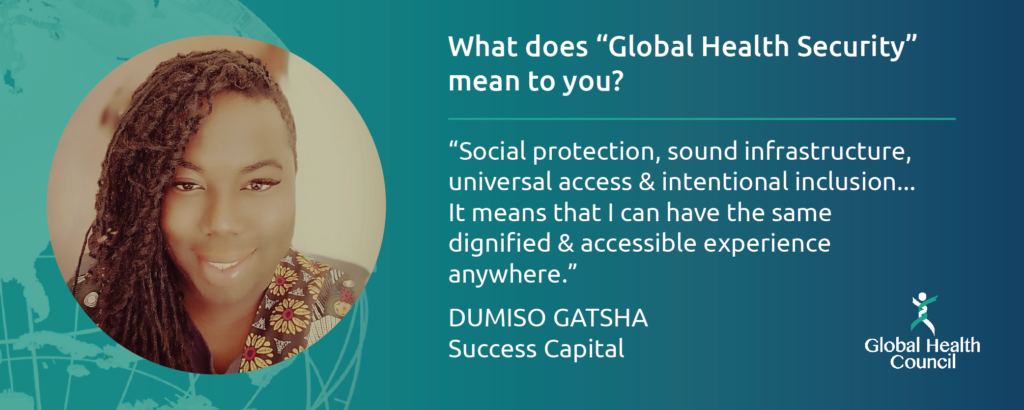Symposium Blog Series: Dumiso Gatsha

The Global Health Landscape Symposium is less than a month away! This year’s convening will focus on:
- Defining global health security; and
- Health equity in the context of global health security.
We wanted to get a jump start on the conversation by talking to a few of the diverse organizations that will be joining us on December 9 and 10. Our first conversation features Dumiso Gatsha, founder of Success Capital, an LGBTIQ+, youth-led, managed, and serving organization linking grassroots experiences with global and regional mechanisms. Dumiso’s perspective was invaluable as we consider what we want to achieve at the Symposium:
How do you define the term “global health security”?
It’s realizing the right to health along with its socio-economic determinants. For me, this means social protection, sound infrastructure, universal access, and intentional inclusion in both preventative- and treatment-related health service provisions, care, and policies. It means that I can have the same dignified and accessible experience anywhere. For example, in my country of Botswana, that might mean a health post in a remote village next to the Kalahari Desert or a peri-urban public referral hospital in Francistown. In either case, I would be able to access the same level of quality care. Global health security also means that there is enough expertise to address unsafe abortion incidents as there would be in the HIV response.
Does including the “security” terminology help or hurt efforts in terms of influencing policy and funding decisions?
I don’t think it helps or hurts. It might confuse policymakers or lead to conflating health issues with intelligence/militarism under the pretext of biomedical warfare. Policy and funding decision-makers don’t always have the expertise or time to read, listen, and engage. So, the use of the term “global health security” would have to be strategic and diplomatic to manage expectations.
From a less restrictive perspective, “global health security” appeals to the human rights-based approach to health: safeguarding and strengthening preparedness, prevention, and treatment equally and ensuring that there is the possibility of accountability or remedy where there are shortcomings.
How does the current “global health security” narrative impact marginalized communities?
The current narrative affirms that marginalized communities are often an afterthought. They are never engaged or included at the design, exploration, or intervention conceptualization stages unless they are the subjects of experimental/pathological interventions.
Prevalent narratives showcase how institutionally supremacist knowledge production, expertise, and deliberations are against marginalized communities. This can partly be attributed to historical and social injustices, systemic inequities, and economic hierarchies that have disadvantaged Black people, people of color, disabled, migrant, queer, youth, and many other communities. The current narrative excludes these communities because they aren’t a majority and are often considered outliers in various forms of public/economic health participation.
What do we balance equity, access, and security in global health?
There is a need to seek out, harvest, and be intentional in strengthening skills, means of participation, and engagement of marginalized communities. This is the only way that ensures more equity and access. Recalibrating infrastructure, ways of working, and policy-making mechanisms ensure that all three can be achieved and balanced without compromising either. This means co-creative, participatory, and decolonized approaches to policy and programming.
Can you think of a recent example, perhaps during COVID-19, of global health security interventions and preparedness efforts that worked really well in your country?
I keep reflecting on the HIV response because it has a long history of learning curves, research advancements, and community involvement. Success Capital Organisation, as a sub-sub-recipient of the Global Fund, had insight and was engaged in contributing towards the continuity of community health referral services, sharing of human rights issues, health services, communication for behavioral change, and inclusion in the response to COVID-19.
Although Botswana, like many other countries, was not politically, economically, or socially prepared, the social participation infrastructure and established relationships in technical working groups made it possible for key populations to be included in the state response where the government had shortcomings. This ensured that there was some element of inclusion, albeit delayed and under-resourced.
What are you hoping to achieve as a result of this year’s Global Health Landscape Symposium? What would you like to see come out of the convening?
I am hoping to be inspired by solidarity beyond performative allyship and co-opting of marginalized communities’ experiences and narratives. I would like to see more reflection and action on meaningful engagement and participation of those left behind in public health governance, narratives, and interventions. I would like to see tangible, S.M.A.R.T. commitments that can be equitably resourced and collaborative for more meaningful policies and programming in multilateral cooperation, social participation, and health governance.
Is there anything else you’d like to share about the Global Health Landscape Symposium?
Let it not be another ”talk-shop.” The symposium’s success should be measured by the collective, individual, and institutional actions that follow it. It would be a missed opportunity for meaningful, equitable, anti-racist, pro-poor, diverse, and inclusive approaches to global health improvement and governance.